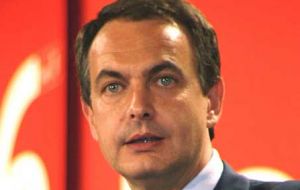MercoPress. South Atlantic News Agency
Spain to halt economic decline with US style incentive package
 Zapatero promises measures to protect economy
Zapatero promises measures to protect economy Spain's Prime Minister Jose Luis Rodriguez Zapatero promised short-term measures and US style incentives to halt an economic decline, especially in the construction sector, over his second term.
"The government ... will immediately adopt several measures to halt the economic slowdown" Rodriguez Zapatero said in his first speech to parliament since the Socialist Party was re-elected on March 9. Among the measures, he mentioned a campaign promise for a 400 Euros tax rebate which he said would be approved at the first cabinet meeting of his government's second term. He also promised efforts to revive the construction industry, which has been the driving force of Spain's decade-long economic boom but whose fortunes have sagged amid a correction in its once buoyant housing market. The construction industry employs 13% of Spain's workforce. The Spanish president promised to dip into a budget surplus to "speed up public works projects" and to help unemployed workers from the construction sector. The whole package involves 22 billion Euros. Spain is the Euro zone fourth economy. He said "the beginning of this legislature will be less positive than the end of the previous one (due to) ... the crisis in the United States, the difficulties of financial markets and the rise in the price of oil and certain food items combined with the difficulties in Spain's construction sector. "But after this temporary pause, we will once again find the levels of growth of the last legislature" said Rodriguez Zapatero adding the Spanish economy fundamentals "were in good shape to face up to the global crisis; in the last four years we've grown more and created more jobs that any other country in our area". The Bank of Spain predicts the economy will grow 2.4% this year, its lowest rate in over a decade and after 3.8% in 2007. The bank also warned about the risks if the world credit crunch persists. Spain's second-largest bank, BBVA, on Monday predicted between 330,000 and 450,000 construction jobs will be lost during 2008 and 2009, with the overall unemployment rate climbing to 9.5% and 11%. The unemployment rate hit 8.6 percent last year in the first rise since 2003. The low interest rates that followed Spain's accession to the Euro zone in 1999 fuelled a housing boom but the market began to slump early last year as borrowing costs rose, property prices stalled and the global credit crunch all hit home. Spain had a budget surplus for the third year running in 2007, equivalent to 2.23% of GDP and since the EU calls for the budget deficit to be kept to less than 3% annually, Spain has considerable theoretical room to boost spending. The Socialists who don't have a majority in parliament expect to loose a ratifying vote on the second term of president Rodriguez Zapatero on Wednesday but are certain he will be confirmed by a simple majority on a second vote on Friday. The conservative opposition has announced that this Wednesday's parliament debate will be used to question Socialist policies that have led to a record 10% GDP current account deficit, record indebtedness of consumers and a dangerous real estate bubble




Top Comments
Disclaimer & comment rulesCommenting for this story is now closed.
If you have a Facebook account, become a fan and comment on our Facebook Page!